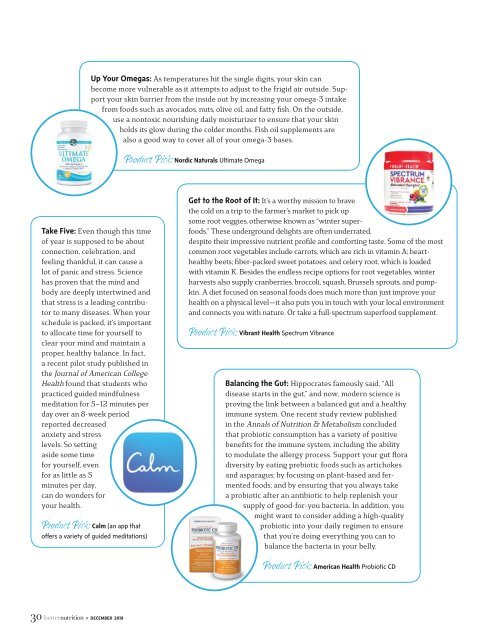Create successful ePaper yourself
Turn your PDF publications into a flip-book with our unique Google optimized e-Paper software.
Up Your Omegas: As temperatures hit the single digits, your skin can<br />
become more vulnerable as it attempts to adjust to the frigid air outside. Support<br />
your skin barrier from the inside out by increasing your omega-3 intake<br />
from foods such as avocados, nuts, olive oil, and fatty fish. On the outside,<br />
use a nontoxic nourishing daily moisturizer to ensure that your skin<br />
holds its glow during the colder months. Fish oil supplements are<br />
also a good way to cover all of your omega-3 bases.<br />
Product Pick: Nordic Naturals Ultimate Omega<br />
Take Five: Even though this time<br />
of year is supposed to be about<br />
connection, celebration, and<br />
feeling thankful, it can cause a<br />
lot of panic and stress. Science<br />
has proven that the mind and<br />
body are deeply intertwined and<br />
that stress is a leading contributor<br />
to many diseases. When your<br />
schedule is packed, it’s important<br />
to allocate time for yourself to<br />
clear your mind and maintain a<br />
proper, healthy balance. In fact,<br />
a recent pilot study published in<br />
the Journal of American College<br />
Health found that students who<br />
practiced guided mindfulness<br />
meditation for 5–12 minutes per<br />
day over an 8-week period<br />
reported decreased<br />
anxiety and stress<br />
levels. So setting<br />
aside some time<br />
for yourself, even<br />
for as little as 5<br />
minutes per day,<br />
can do wonders for<br />
your health.<br />
Product Pick: Calm (an app that<br />
offers a variety of guided meditations)<br />
Get to the Root of It: It’s a worthy mission to brave<br />
the cold on a trip to the farmer’s market to pick up<br />
some root veggies, otherwise known as “winter superfoods.”<br />
These underground delights are often underrated,<br />
despite their impressive nutrient profile and comforting taste. Some of the most<br />
common root vegetables include carrots, which are rich in vitamin A; hearthealthy<br />
beets; fiber-packed sweet potatoes; and celery root, which is loaded<br />
with vitamin K. Besides the endless recipe options for root vegetables, winter<br />
harvests also supply cranberries, broccoli, squash, Brussels sprouts, and pumpkin.<br />
A diet focused on seasonal foods does much more than just improve your<br />
health on a physical level—it also puts you in touch with your local environment<br />
and connects you with nature. Or take a full-spectrum superfood supplement.<br />
Product Pick: Vibrant Health Spectrum Vibrance<br />
Balancing the Gut: Hippocrates famously said, “All<br />
disease starts in the gut,” and now, modern science is<br />
proving the link between a balanced gut and a healthy<br />
immune system. One recent study review published<br />
in the Annals of <strong>Nutrition</strong> & Metabolism concluded<br />
that probiotic consumption has a variety of positive<br />
benefits for the immune system, including the ability<br />
to modulate the allergy process. Support your gut flora<br />
diversity by eating prebiotic foods such as artichokes<br />
and asparagus; by focusing on plant-based and fermented<br />
foods; and by ensuring that you always take<br />
a probiotic after an antibiotic to help replenish your<br />
supply of good-for-you bacteria. In addition, you<br />
might want to consider adding a high-quality<br />
probiotic into your daily regimen to ensure<br />
that you’re doing everything you can to<br />
balance the bacteria in your belly.<br />
Product Pick: American Health Probiotic CD<br />
30 • DECEMBER <strong>2019</strong>

















